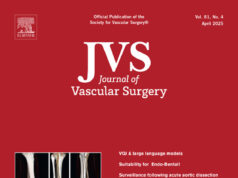
Enhanced Recovery After Surgery (ERAS) pathways have been beneficial for many surgical specialties and are now available to guide the perioperative care of patients undergoing open aortic operations. The Vascular Quality Initiative (VQI) will discuss this important topic starting at 8:35 a.m. Wednesday, June 15, during the VQI@VAM annual meeting at the Hynes Convention Center (Room 312) Boston (June 14–15).
The Society for Vascular Surgery (SVS) and the ERAS Society jointly endorsed the recent consensus statement, “Perioperative care in open aortic vascular surgery,” which was published in the Journal of Vascular Surgery in June. With the goal of delivering high-quality perioperative care and reducing the physiologic stress of surgery, this consensus statement is intended to help address the many perioperative challenges faced by vascular surgery patients, who are often older, frailer and with more comorbidities than the average surgical patient.
The 36 graded recommendations emphasize the coordination and timing of care across disciplines to reduce unnecessary care variation and to give patients the best chances of quickly getting back to normal. Recommendations based on the universal ERAS elements include preadmission (screening, preoperative exercise therapy/prehabilitation, perioperative anti-platelet, anticoagulation plan); preoperative (fasting, carbohydrate loading, venous thromboembolism prophylaxis, pre-anesthetic sedative and analgesia medication, antimicrobials, nausea/vomiting prevention); intraoperative (anesthetic protocols, epidural analgesia, body temperature management, drainage of surgical site); and postoperative (multimodal analgesia and opioid reduction strategies, nasogastric drainage, oral feeding, fluid therapy, urinary drainage, glycemic control, early mobilization strategy, discharge education, audit of outcomes).
Some of the recommendations are a clear departure from current routine care but should be carefully evaluated as there is high-level evidence that change is needed. For example, pre-operative fasting times should be dramatically reduced and the use of post-operative nasogastric tubes should be minimized. There are other recommendations based on more heterogenous and less rigorous data, particularly around pre-operative optimization and fitness for surgery. Numerous research gaps have been identified, and as ERAS programs are developed across the country there will be opportunities for multicenter research and VQI-supported quality improvement charters.












